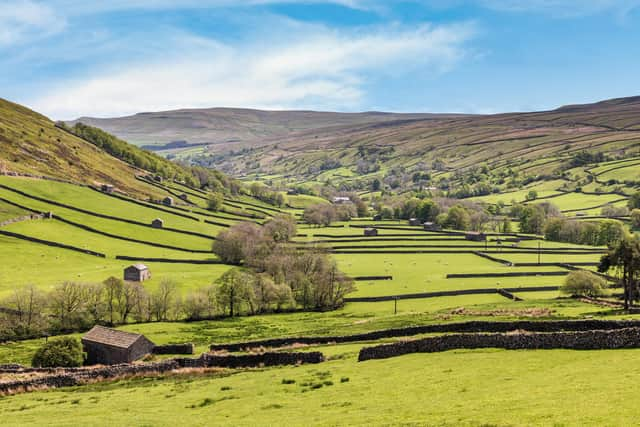Battleground Yorkshire: Farmers need more security in an increasingly uncertain climate
“Well, the main issue is the Great British weather,” laughs Richard Pears from the National Farmers' Union (NFU), “but there’s nothing the Government can do about that.”
England has seen the wettest 18 months since records began and it has caused havoc with the country’s farmers, with a drastic reduction in crop production because of low levels of planting in waterlogged fields and a harsh winter causing further losses in the UK.
Advertisement
Hide AdAdvertisement
Hide AdThe effect of this, along with the low pricing for crops and high input costs such as fertiliser have shown once again that farming is the “most volatile manufacturing sector in the world,” according to Kevin Hollinrake, the Thirsk and Malton MP whose father was a farmer.


Any party would win a majority for life if it had an answer to solve the British weather, but as it stands the incoming government faces several challenges to give farmers security in an increasingly insecure world.
Pre-Brexit, the UK’s farming worked under the EU’s Common Agricultural Policy, which was for many a “blunt instrument” to deal with the vast array of production in Europe, but one which saw British farmers receive their subsidies from Brussels.
The policy saw more money go to larger farms, with critics saying that this led to less emphasis on the environment. Currently the CAP, which makes up nearly a third of the EU’s budget, sends 80 per cent of the public money to farming animals, and the large carbon footprint which comes alongside it.
Advertisement
Hide AdAdvertisement
Hide AdPost-Brexit, the English farmers have a new paymaster, the Treasury, with Environmental Land Management (ELM) schemes becoming the major source of subsidy for farmers.
They work by rewarding farmers for undertaking measures to improve things such as biodiversity and eco-friendly schemes, and have had a chequered yet short history after almost being axed under Liz Truss as it was dragged kicking and screaming into anti-green rowback we’ve in recent years.
“Even those who have written them off, unfairly in my view, I’d strongly encourage them to look at them again,” says Jonathan Roberts, from the Country Land and Business Association (CLA), adding that there has been a lot of “misinformation” about the schemes through poor communication from government.
Brexit, he says, has not been the disaster that many have feared for farmers, but rather that it was “very naive” to say that “one day we can just flick a switch between the old and the new and everything is easy and simple”.
Advertisement
Hide AdAdvertisement
Hide AdThe agricultural transition between 2021 and 2027 means that now the industry is looking to the future, with farmers “desperate” for certainty, says Richard Pears from the National Farmers' Union (NFU).
“We know we have a budget for agriculture in this parliament, we actually have no idea what the budget will be after this parliament,” he adds, with the effect of future trade deals potentially set to have a “harmful” impact on UK farmers.
“Farmers are keen to engage with the government of the day, but it’s very hard to make many judgements because I don’t think there’s any specific policy areas that Labour have produced going into the next election,” he says.
With news breaking this week that post-Brexit border fees for plant and animal products could further push up UK prices, there is also a question to be had about who should be profiting, if anyone, from the public’s cost of living crisis,
Advertisement
Hide AdAdvertisement
Hide Ad“There's a big question that we need to have to answer at some point, which is who is making money out of our food, the supply chain, because it's not farmers, even in times of economic crisis,” says Mr Roberts.
“We have a sort of permanent-crisis at the moment, not just here but elsewhere in the world, and supermarkets tend to be doing exceptionally well.
“There’s always profits kicking around, and there’s plenty of profits elsewhere in the supply chain, but farmers aren’t making money.
“We really have to get to the bottom of that,” he adds.
Comment Guidelines
National World encourages reader discussion on our stories. User feedback, insights and back-and-forth exchanges add a rich layer of context to reporting. Please review our Community Guidelines before commenting.